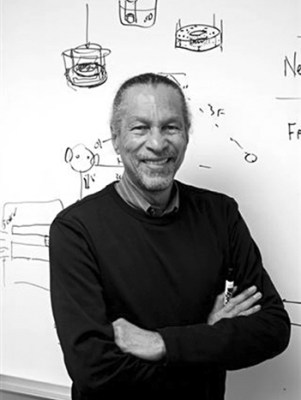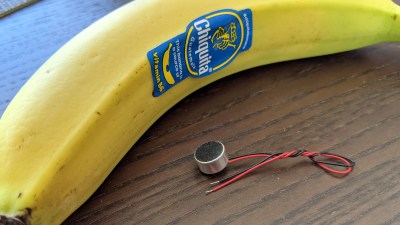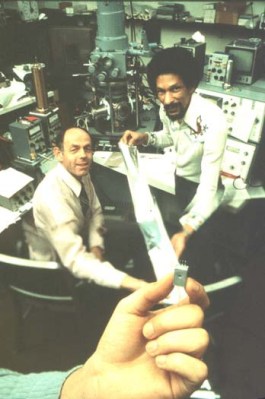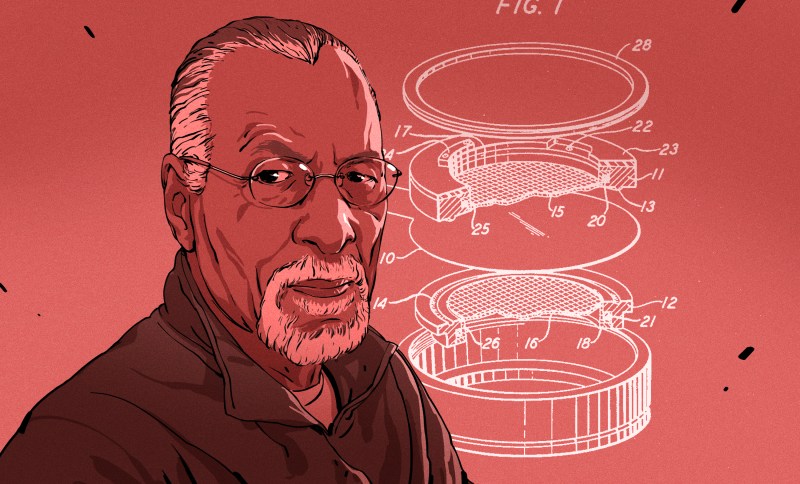I’d be surprised if you weren’t sitting within fifty feet of one of James Edward Maceo West’s most well-known inventions — the electret microphone. Although MEMS microphones have seen a dramatic rise as smartphone technology progresses, electret microphones still sit atop the throne of low-cost and high-performance when it comes to capturing audio. What’s surprising about this world-changing invention is that the collaboration with co-inventor Gerhard Sessler began while James West was still at university, with the final version of the electret springing to life at Bell Labs just four years after his graduation.
A Hacker’s Upbringing
James’ approach to learning sounds very familiar: “If I had a screwdriver and a pair of pliers, anything that could be opened was in danger. I had this need to know what was inside.” He mentions a compulsive need to understand how things work, and an inability to move on until he has unlocked that knowledge. Born in 1931, an early brush with mains voltage started him on his journey.

Having found a radio in the trash, he set out to repair it. James describes the event by mentioning that this was in the days before houses had outlets in the walls; the only source of electricity was the light socket. He got up on a bed and when plugging in the radio, receiving a shock that prevented him from letting go to break the connection by himself. His older brother knocked him loose, and although he wasn’t seriously injured, he became determined to understand how electricity worked.
This curiosity made him a perfect helper for a cousin who was taking on jobs wiring up rural homes. During high school he was fascinated by the telephone system, but his parents forbade from using the phone without a serious reason for it. He and a friend stole wire from a telephone company lot, stringing a line between their houses. They made their own telephone system.
The Long Way to a Career in Physics
It’s obvious James had a strong interest in the sciences, yet his parents did not support this pursuit as a career path. Growing up in Virginia, Jim Crow laws and widespread racism meant these professions were closed off to black people.
His parents had power over the purse, so James entered school as pre-med. Their hope was that he would go into practice with his uncle who had built a clinic — but James did not enjoy it. His father was adamant that he stick to it or just not even bother going to school at all, going so far as to introduce James to two black men he knew who had earned their Ph.D but could not find employment.
In working to switch his major he dropped out of Wilberforce University mid-term in 1950 and was drafted into the Korean war before he could begin anew. Two years, and two purple hearts later, James was back from the war and entered Temple University where he studied Physics.
Life at Bell Labs
Applying en masse for interships posted on a bulletin board at school, James found his way to Murray Hill, the location of AT&T’s Bell Labs. He was assigned to the Acoustic Research department studying the interaural time delay. This is the difference in your left and right ear detecting sound, and it’s one way we locate the direction from which sounds originate.

The lab was using condenser microphone technology as headphones, but they put out a very very limited amount of sound and it was limiting research into the topic. James West found a German research paper on solid dielectric elements. He changed the test rig to use this technology, powering his new headphones with a 500 V battery (!). It worked, and his talent turned heads at the labs.
James went back to school in the fall with a spring in his step, but by November the research team was calling with a problem: the headphones had stopped working. They sent him a ticket to come back to Murray Hill and troubleshoot. Once again, the compulsion for understanding struck, leading him down a rabbit hole. This was the beginning of his march to unlock the secret of electrets, and in researching the phenomenon he began working with Gerhard Sessler. The two would go on to invent the electret microphone together.
An Extraordinary Microphone

Ultimately the work that West and Sessler did is a story of material science. (This is a recurring theme for Bell Labs inventions, I highly recommend reading The Idea Factory for a deeper dive into this). Their electret design uses a diaphragm made of a metal-coated polymer film that was able to reliably trap a charge and retain it permanently. It delivered the qualities of the condenser mics but didn’t require recharging the plates. Even better, it did it at a fraction of the price. James West explains this in his own words during a fantastic set of video interviews conducting by The History Makers in 2013 (free to watch but registration required):
…when we published in 1962, we were confident from the experiments we had done in the lab, that we had learned to trap charge in this material. And that the activation energy, how much energy you had to apply to that trap to open up, was very high, 150 degrees C, okay. Which meant that we could extrapolate the lifetime at room temperature, from what we call Arrhenius plots, that said that the lifetime at room temperature of that electret would be two, three, four hundred years.
Electret microphones could be manufactured at up to four orders of magnitude less than existing condenser mics, completely solved the problem of high bias voltages, lasted an incredibly long time over a huge range of operating temperatures, and they’re quite small. They were nothing short of an astounding breakthrough. By the 1970’s they were popping up in consumer products, and have been the go-to technology for decades since. For more background on electret microphones, check out Jenny List’s article from last year.

James continued on at Bell Labs for more than four decades. During that time he published prolifically in journals and books, and awarded more than two hundred patents. Looking back on his time there, he mentions that the open-endedness of the work — being able to pursue problems he was interested in and work with others across different disciplines — kept him perpetually engaged in each of his pursuits.
A Leader for Inclusive and Equitable Organizations
James West’s mother, Matilda Omega Miller West, was one of the people featured in the book Hidden Figures. She worked as a mathematician (at the time they were known as computers) for Langley Research Center. Matilda was an officer in the NAACP, and James recalls her losing her job because of Senator Joseph McCarthy‘s view of that organization as adverse and communist. James’ own career might not have happened if he had heeded advice at the time pointing to a lack of opportunity for black people in the sciences. It’s no surprise that he wants to break down these barriers to entry for others following after him. During his tenure at Bell, and since retiring and joining the faculty at Johns Hopkins University in 2001, he has been a strong advocate for fostering diversity in all walks of our society.
In an inverview with Acoustics Today from last September, James discusses his approach to encouraging inclusivity in the STEM fields. Acknowledging the absences of women and underrepresented minorities (W&URM in the quote below) as a problem, one way to enact change is through mentorship. He tells the story of a Baltimore Public Schools STEM initiative that had very low diversity when he joined the board of directors, but with a few years of work the students in the program now more closely reflect the actual demographics of the community:
To make a long story short, the funnel was empty, and the funnel needs to be filled, or at least partially, with qualified W&URM people that want to enter STEM. If you can increase and open that pipeline that will only bring positive change. How can you help? Find and mentor qualified W&URM students in your local area and improve their training so that they have the opportunity and potential for a future in STEM.
Accolades and Current Work
How different would the world have been if James had finished that medical degree? As co-inventor of the electret microphone he made a huge impact and has been recognized many times over for it. He has received honorary doctorates from the New Jersey Institute of Technology, Michigan State, U Penn, Princeton, and Temple. In 2006, President George W. Bush awarded James the National Medal of Technology and Innovation, just one of numerous awards he has received.
At the age of 89, he continues to pursue everything beyond his current understanding through his research at Johns Hopkins. His most recent patent was published in 2020 and applies electret technology to energy harvesting.
















Wow! Great article on a good man.
Hope his father told him he was proud of him and the path he took, cause he should have been!
I read something last year that Black doctors are still not common. It’s a respected profession, and certainly in the past, a Black doctor was an immediate benefit to Black people. Same with Native doctors. So the father probably was giving good advice at thetime. I find it interesting that his mother just happened to be a “computer”, I didn’t see anythig here about her influence.
I do wonder whether he didn’t get much press because he was Black, or because electrets aren’t “spectacular enough”.
A few weeks ago PBS reran a documentary on Percy Julian, who helped make steroids cheap. His work is like many others invisible, but we’d be worse off without cheap steroids or electret microphones. A lot of innovation is mundane and results in “mundane”, but we still benefit.
While I have heard about steroids from Mexican Yams (for birth control) but never heard of Percy Julian, thanks for mentioning. As for his being a doctor, it may have a prestigious job for a Black man at that time, but seeing the talent he had I’d say that he chose the right path. Still inspiring story though, anyway you slice it.
That same drive to understand things may very well have lead to many medical discoveries instead. I am glad that we have people like him regardless.
A perspective from a woman I know, whose father discouraged her from thinking or aiming higher than waitressing or store clerk… Her father was from a small town in a rural district that was hit hard in the depression, they were boiling vegetable peelings from the restaurants for soup. After being conscripted for WWII and serving in Normandy and the Ardennes, he was said to have seen “many horrible things” there. After the war he worked menial manual jobs, feeling privileged to have work at all, given the trials of his youth. His daughter says he was very afraid for her and his other children. Afraid of the horrible things that could happen like in war, afraid of economic difficulties like the depression. He felt he had little power to protect his children against the tides of world affairs. He only knew the blue collar world, he thought that one should be grateful for work enough to fill your belly and have a roof over you. As it was all he knew, he perceived that his limited ability to protect her and her siblings ended at the edges of that world. Therefore he was even more afraid to let them go beyond what he knew. He told them to know their place in the world, be grateful to get any work, like he had. His daughter said it seemed that he actually seemed afraid that there would be trouble with the authorities if you “got above yourself”. He thought school should be attended because “there will be trouble if you don’t” with no notion of the education being a benefit. Despite this, after departing the parental abode, and working at dead end jobs, she took night school at a “business college” to get the bare minimum typing, shorthand, admin skills for an entry level office job. For this she got a diploma. Her father was extremely proud of her, saying things like he never thought it possible that a daughter of his could get a diploma. Nevertheless, his daughter thinks despite the pride, it kind of had him looking over his shoulder, in case there was trouble from his daughter “getting above herself”. Unfortunately her father passed in the late 90s, and we don’t know how proud or scared he would have been to see her get a full on Bachelors degree and a CMA.
Anyway, just an example to say that maybe parents really do in their heart want the best for their children, but sometimes that comes out as trying to protect them from disappointment, failure, persecution or any of the other myriad evils in life, or merely what is to them, the big scary unknown.
This may have been the most thoughtful comment I have read here.
love the article
“At the age of 89, he continues to pursue everything beyond his current understanding through his research at Johns Hopkins.”
Breaking down another barrier, ageism.
That’s one we all eventually face.
Amazing how ageism is an issue until you understand how the most dangerous communities have a hate for “grown ups,” “college kids” and anyone and anything not wanting to be low life and malicious intent nice cute sweet and innocent masked intent acts. Scary… very scary and more need to be afraid of the imminent threats.
Just incredible how many people are hamstrung by their ow families.
Yet perseverence and dedication pays off.
Good read! The fact that some of this story takes place at Bell Labs is no surprise.
Out of curiosity, how is the “Electret microphones could be manufactured at up to four orders of magnitude less than existing condenser mics” figured? I assume most of this cost savings is in the reduction of associated circuitry rather than the manufacturing cost of the capsules themselves, which have more similarities than differences.
I remember the future film about the tiny mic on a Bell phone about ’64, wow. By the mid ’80’s the carbon mic was still in every phone that I rented from the “phone company”, then came deregulation and suddenly everyone had sleek privately owned phones with all kinds of features. I lost track of what they use nowadays, even phone booths are gone. Those Bell standard handsets had great ergonomics and clarity, battle hardened toughness. I only saw the telephone man once when the mic went weak, unscrew and put a new one in. Done.
Carbon microphones could often be refreshed by giving them a hard whack. I think putting the element in a stove was also suggested.
The elements contain granulated carbon, and over time they get packed together, so the element stoos working.
Whacking them against a hard service breaks up the granules again.
The only carbon microphone I have left isn’t. The elementwas chaged to dynamic, complete with preamp. Drops right in instead of the carbon element.
Adjusted for inflation those Bell phones cost over $1000 each, massively overbuilt, no competition, deliberate hobbling of features to stimulate purchases of even more outrageous overpriced gear. Decades of anticompetitive behavior and overpriced phone service to pay for the ridiculous overdesigned.headsets. Thank goodness that crap is gone.
Remind me, how much is a new quality mobile phone these days?
Land Line telephone audio is much better than Mobile phone.
HD audio on mobile phone calls is a thing now.
They were designed for a 40-year service life. You could throw them against the wall, and they’d survive.
The ergonomics of the 500-series desk phone are superb.
I’ve bought cheap phones from a big-box store to provide emergency service for a day to a customer whose PBX had died, only to have them die within hours. Had to replace them with less-cheap ones, which did last out the day.
I have my uncle’s old rotary wall phone from the 60’s. It would still work if I connected it to a POTS line, or even as an extension off my Ooma.
I talked to an ITT executive in 1976 and he told a different story. Telephone companies were very heavily regulated, federally and state-by-state. No politician wanted to be blamed for a rate hike caused by new, more expensive features, so telcos were prohibited from offering new stuff.
For what it’s worth, although telcos were a monopolies in the districts they operated in, AT&T did not operates throughout the US. ITT had some areas, as did Sylvania and scores of other small companies.
I think it’s just as well that new consumer phone tech wasn’t introduced in the 1960s and early 1970s. Most of the ideas were really bone-headed and not well adapted to either current or future technology. Putting them into production back then would have meant legacy maintenance and compatibility issues that would have haunted us to this day.
Not to take anything away from what he did, but I understand that the Japanese were using electret-biased condenser mics in their WWII comm rigs. Confused the hell out of the Americans at first.
And his work was built of some German theoretical work. Building on a foundation of other work hardly diminishes the achievement!
50ft to the next electret mike? No, at least 4 pieces at less than 50cm :) 2 in the smartphone, 1 in the landline cordless and 1 in the webcam are the ones I know about. But there are a few headsets around also.
Awesome technology; I’ve made a few binaural recordings using $1.50 electret capsules that are just amazing. I’ve always messed with mic circuitry, and in the last 6 months have finally been elbow-deep with some of the higher-end electret mic capsules I’ve amassed over the years, and following some online DIY mic projects. And I knew nothing about James West. But now I do. Thanks HaD.
I worked at the Labs as a contractor in late 80s early 90s. Morris Plains NJ. Best job I ever had (as an anthropologist!)